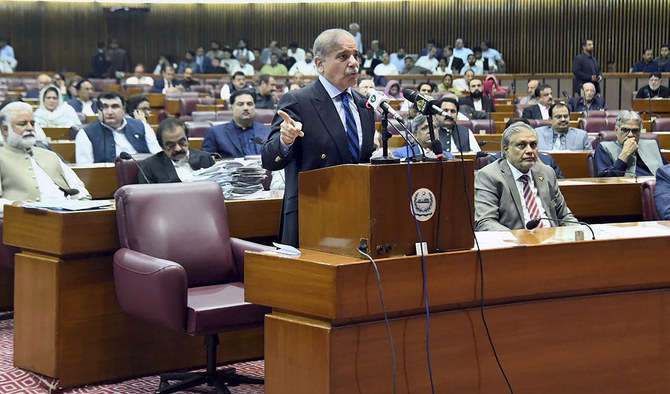ISLAMABAD: Pakistan's parliament was dissolved by the president on Prime Minister Shehbaz Sharif's advice late Wednesday night, setting the stage for a caretaker setup to take charge ahead of national elections.
Sharif took over power in April last year after then Prime Minister Imran Khan was ousted in a parliamentary vote of no-confidence. The outgoing PM’s tenure technically expired on August 12, but he dissolved the assembly three days early to give the caretaker government 90 days to organize general elections, against 60 days if he were to step down on time, as per the constitution.
The president is now bound to appoint a caretaker prime minister in consultation with the outgoing prime minister and opposition leader. The same procedure is followed by governors in the provinces. Sharif has said a name for caretaker PM has not yet been finalized. He is expected to meet Opposition Leader Raja Riaz to discuss the matter today, as per the constitutional requirement.
“On dissolution of the Assembly on completion of its term, or in case it is dissolved under Article 58 or Article 112, the President, or the Governor, as the case may be, shall appoint a care-taker Cabinet,” Article 224 of the Pakistani constitution reads.
“The care-taker Prime Minister shall be appointed by the President in consultation with the Prime Minister and the Leader of the Opposition in the outgoing National Assembly, and a care-taker Chief Minister shall be appointed by the Governor in consultation with the Chief Minister and the Leader of the Opposition in the outgoing Provincial Assembly.”
In case the outgoing PM and leader of the opposition do not agree on a name for caretaker prime minister within three days of the dissolution of the assembly, the prime minister and the leader of the opposition share two nominees each to a committee constituted by the speaker, comprising eight members of the outgoing National Assembly, the Senate or both.
The committee, which then has three days to finalize a name, must have equal representation from the treasury and opposition benches.
In case the committees also fail to agree on the name, the nominees are referred to the Election Commission for a final decision within two days, until which time the incumbent prime minister will continue to hold office.
The federal caretaker cabinet is then appointed on the advice of the caretaker prime minister and the president.
The caretaker cabinet in Pakistan primarily has one job, to create a conducive environment for free and fair elections in the country and ensure they are held within 90 days of the assembly's dissolution.
However, it is widely believed the vote could be delayed several months in Pakistan with the election commission set to start redrawing hundreds of constituencies based on a fresh census that was approved last week.
Analysts have said any delay in the election could fuel public anger and add to uncertainty in the nuclear-armed nation.
The last general election in July 2018 was won by the party of cricketer-turned-politician Imran Khan, who was sworn in days later as prime minister for the first time.
Khan has been at the heart of political turmoil since he was ousted as prime minister in a no-confidence vote last year, raising concern about Pakistan's stability. He has since been convicted and jailed in a graft case, following which he has been barred from taking part in any election for five years.
Khan has accused the powerful military, which has ruled Pakistan since independence in 1947, of being responsible for his ouster. The military has denied the charge.
Khan was replaced by Sharif, who has been grappling with a debilitating economic crisis and historically high inflation levels as the government implemented painful reforms to secure funding from the International Monetary Fund (IMF).
In addition to the legal issues that could crop up if the vote is delayed, the side-lining of Khan, the country's most popular leader according to polls, will cast doubt over the credibility of the elections.












